人教版高中英语选修八 Unit5 Meeting your ancestors Reading课件(共57张)
文档属性
| 名称 | 人教版高中英语选修八 Unit5 Meeting your ancestors Reading课件(共57张) |  | |
| 格式 | zip | ||
| 文件大小 | 261.7KB | ||
| 资源类型 | 教案 | ||
| 版本资源 | 人教版(新课程标准) | ||
| 科目 | 英语 | ||
| 更新时间 | 2019-03-04 21:48:48 | ||
图片预览

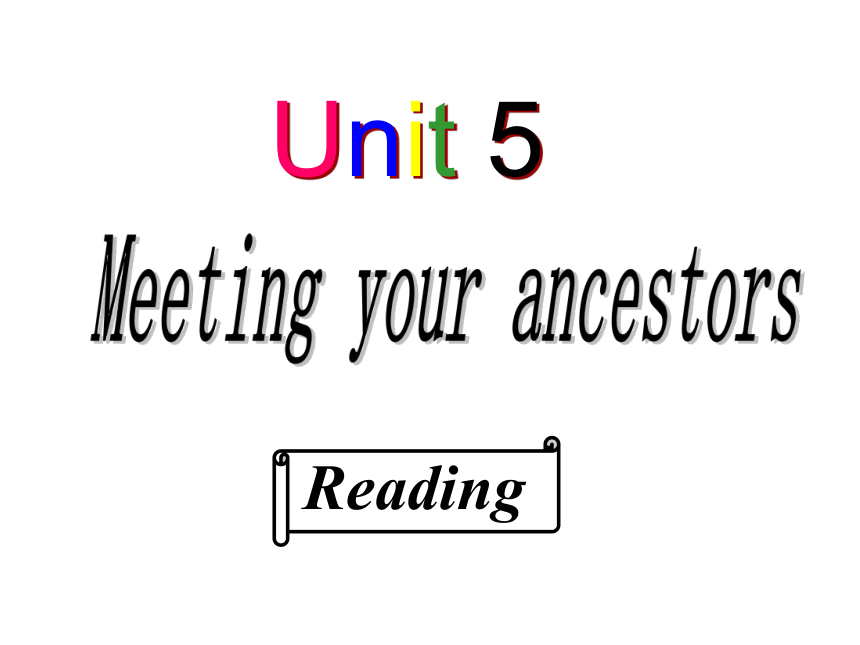
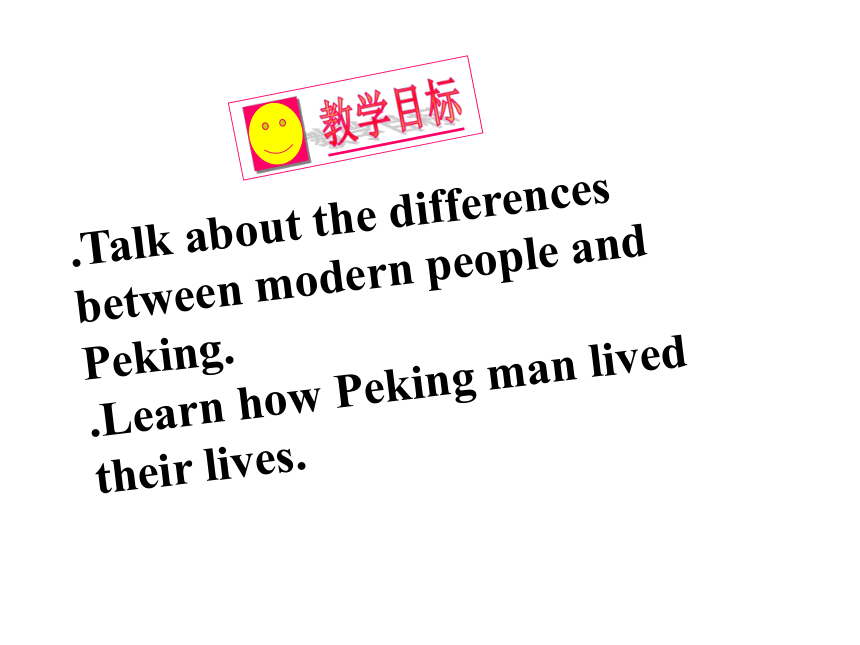
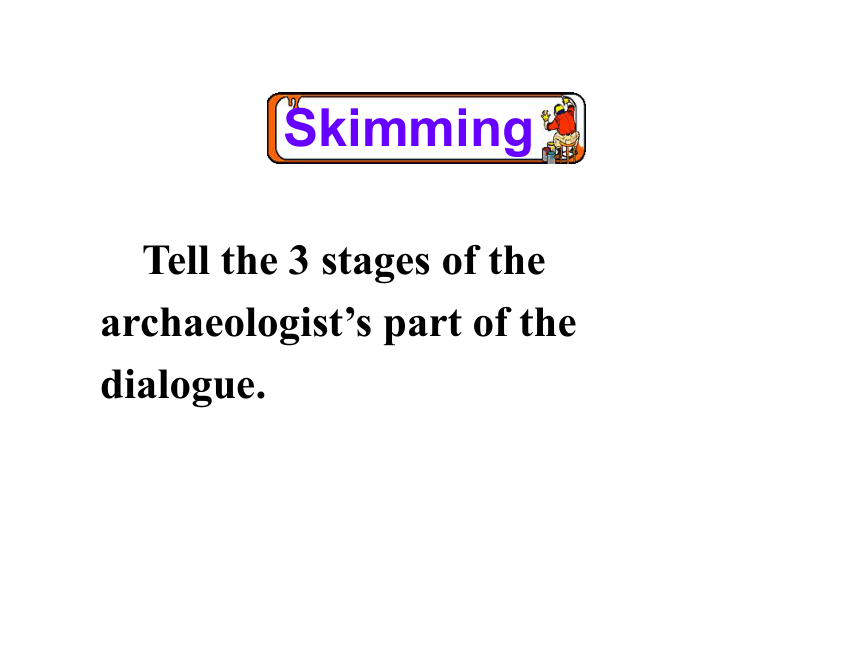
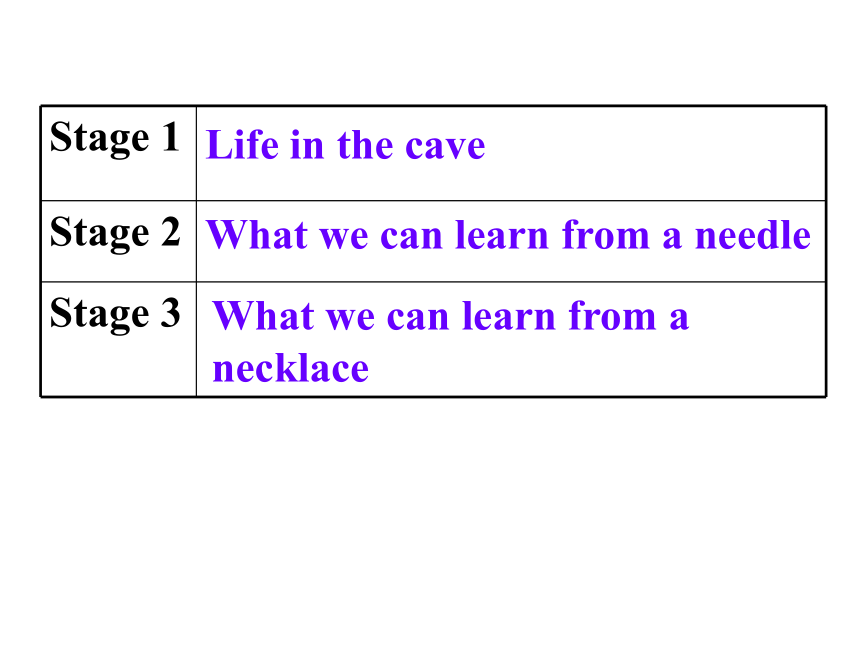
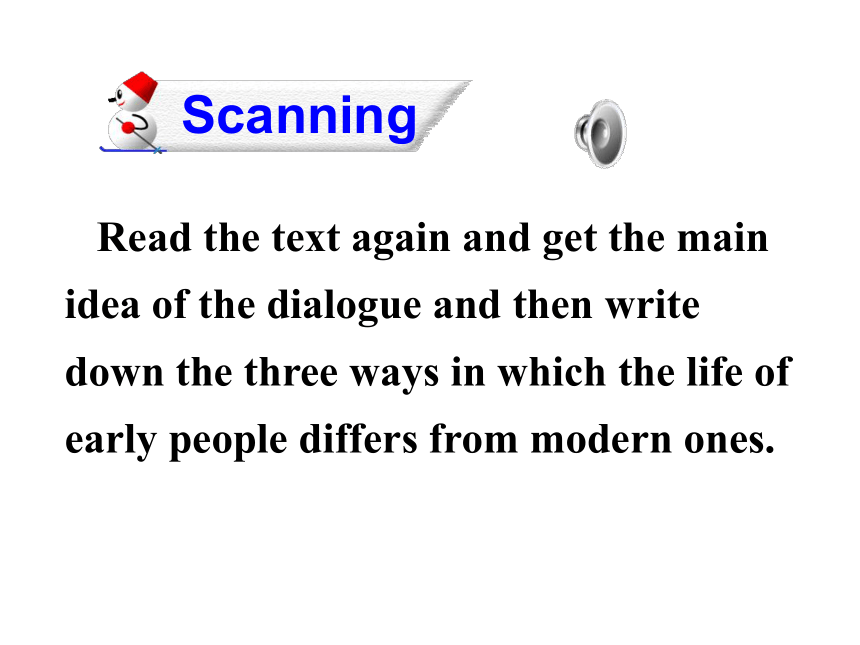
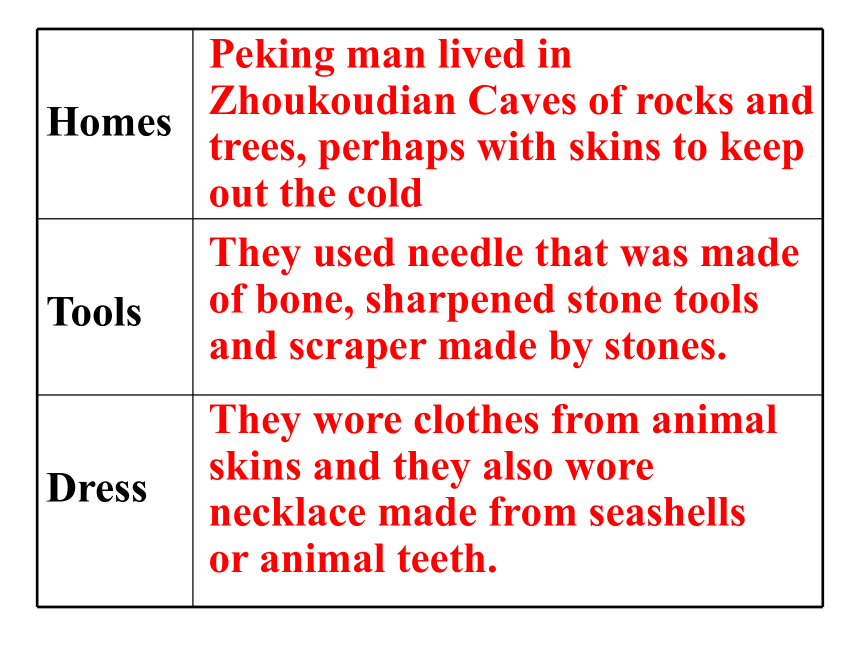

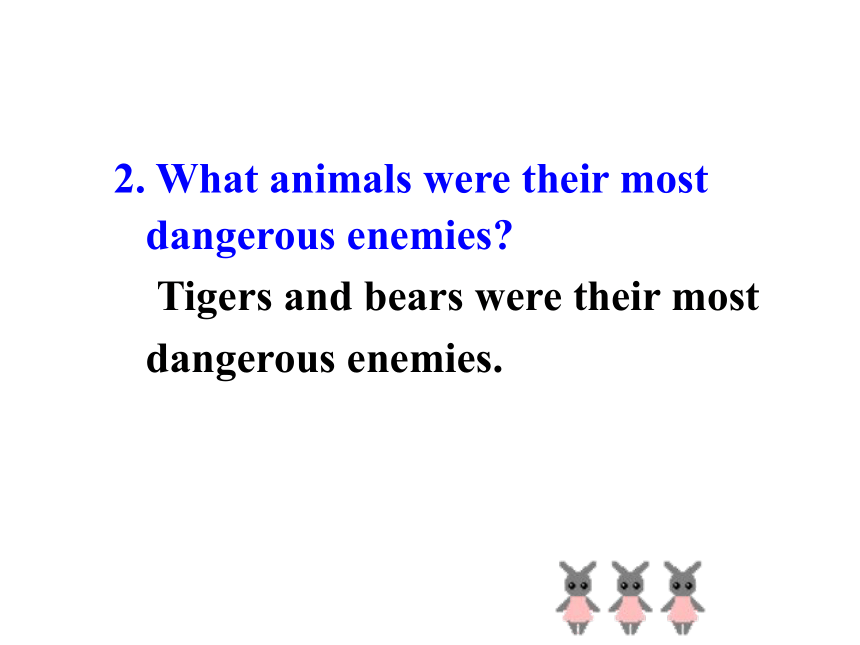
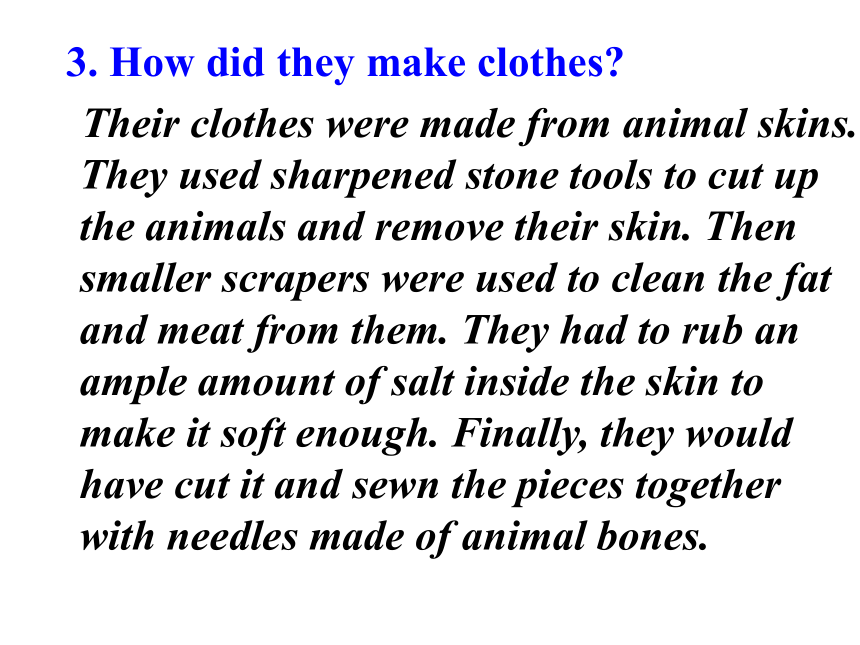
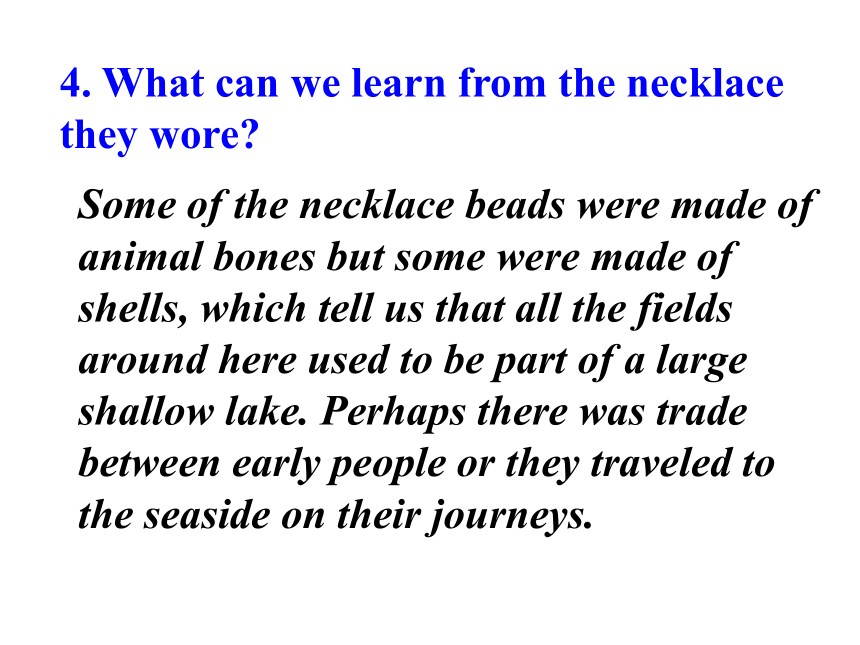

文档简介
课件57张PPT。新课标高二版.选修八Unit 5Meeting your ancestorsReading.Talk about the differences between modern people and Peking.
.Learn how Peking man lived their lives. Tell the 3 stages of the archaeologist’s part of the dialogue.SkimmingLife in the caveWhat we can learn from a needleWhat we can learn from a necklace Read the text again and get the main idea of the dialogue and then write down the three ways in which the life of early people differs from modern ones.ScanningPeking man lived in Zhoukoudian Caves of rocks and trees, perhaps with skins to keep out the coldThey used needle that was made of bone, sharpened stone tools and scraper made by stones.They wore clothes from animal skins and they also wore necklace made from seashells or animal teeth. 1. How did they keep warm?
They constructed the fires in the center of the caves to keep them warm. They might have kept fires burning all winter. They hung animal skins at the cave mouth to keep out the cold. Careful reading Answer the following questions after a careful reading.2. What animals were their most dangerous enemies?
Tigers and bears were their most dangerous enemies. Their clothes were made from animal skins. They used sharpened stone tools to cut up the animals and remove their skin. Then smaller scrapers were used to clean the fat and meat from them. They had to rub an ample amount of salt inside the skin to make it soft enough. Finally, they would have cut it and sewn the pieces together with needles made of animal bones.3. How did they make clothes? Some of the necklace beads were made of animal bones but some were made of shells, which tell us that all the fields around here used to be part of a large shallow lake. Perhaps there was trade between early people or they traveled to the seaside on their journeys.4. What can we learn from the necklace they wore?5. What did the earliest people use fire for?
They used fire to keep them warm, cook the food and scare the animals.
6. What’s the main idea of the text?
A brief introduction of the life and habits of the earliest people in Zhoukoudian.7. Which of the following shows us the earliest people and the modern people have something in common?
A. People hung animal skins to keep out the cold.
B. People never grew their own crops.
C. People use science.
D. People care about their appearance.8. What can we infer from the sentences--- “This one looks very like a fish bone. Is it reasonable? ---Yes indeed, as the botanical analyses have been specifically showing us, all the fields around here used to be part of a large shallow lake. Undoubtedly there were fish swimming in it.”?
A. Being an archaeologist needs a wide range of knowledge.
B. A lake is not the sea.
C. People can identify the fish by the colour.
D. A fish bone can be made into a necklace.Stone, wooden or brick house. CaveVery accurate Compare modern people and Peking man, and finish the following form.Beautiful furniture with lots of ornaments mostly made of wood or other special materials.Natural furniture made of stone or wood. AccurateWatching TV, surfing the Internet and traveling. Enjoy the nature or family get-together. InaccurateFruit, vegetables, meat and fish, etc. Natural food, such as nuts and fruits. AccurateNatural and man-made fibres. Clothes made from animal skins, leaves Accurate 1. alternative n.
something that you can choose to do or use instead of something else 替换物
There are some alternatives to our plan.
有几种方案可以代替我们的计划。Explanation2. You must be aware that it's here that we've found evidence of some of the earliest people who lived in this part of the world.
想必你们知道, 正是在这儿我们找到 了居住在世界这个部分最早人类的证据。 He had no alternative but to go there alone.
他别无选择, 只好一个人去那儿。 a. You must be aware that…主句后接由强调句和定语从句组成的宾语从句。
must是作为情态动词表示肯定推测, 译作“一 定, 肯定”。只用于肯定推测。 对现在或将来事实推测,用 “must do”。
You must be hungry after a long walk.
走了很长的路, 你一定很饿。
对正发生或进行的事进行推测, 用“must be doing”。 The light is on. He must be doing his homework now.
灯亮着, 他一定正在做作业。
对过去的事进行推测, 用“must have done”。
The ground is wet. It must have rained last night.
地是湿的, 昨晚一定下雨了。 此时, 应注意反意疑问句的构成。如果句中有表示过去的时间状语, 反意疑问句用“didn’t+主语”; 如果句中无表示过去的时间状语, 反义疑问句用 “haven’t/hasn’t+主语”。
He must have arrived here last night, didn’t he?
他一定昨晚就来这儿了, 不是吗?
He must have arrived here, hasn’t he?
他一定来这儿了, 不是吗? b. aware adj.意识到的, 知道的。通常用作表语。
We should be aware that a lot of animals are becoming endangered.
我们必须清楚地认识到许多动物正濒临灭绝的危险。 be aware of sth. 知道;意识到
Though most smokers are aware of the dangers of smoking, they won't given up.
c. it’s here that we’ve… 是强调句,其基本句式是It is (was)+被强调部分+that (who)+句子其他部分。此结构强调的成分仅限于主语,宾语和状语。 It was your mother whom I met in the street.
我在街上碰到的是你的母亲。
It was in the street that I met your mother.
我是在街上碰到你母亲的。
It was she who had been wrong.
错的是她。 It is what you do rather than what you say ___ matters.
A. that
B. what
C. which
D. this
本题强调主语, 此时应用that来引导。 d. “Who lived in this part of the world”是定语从句修饰先行词 people。people在定语从句作主语, 故用关系代词who来引导定语从句。3. I’m sorry to interrupt you but how could they live here?
很抱歉打扰你, 我想问问他们是怎么在这里生活的?
句型“I’m sorry...but...”是口语中委婉的表达, “but”表示语义上的转折。 — Are you free this weekend?
— I’m sorry, but l have lots of work
to do.
--- 周末有空吗?
--- 对不起, 我有大量的事要做。2) 打岔; 插嘴
It is rude to interrupt.
“Don’t interrupt,” he said.1)阻断, 中断
His studies were interrupted by the war.
Don’t interrupt him, for he hasn’t finished yet. interrupt v. 打扰,打断,阻碍。常有 “使……停止(中断)”的意思。 His speech was constantly interrupted by applause. disturb v. 打扰, 妨碍。常指失去了正常的状态或导致困难产生。 Bad dreams disturbed her sleep.区别: interrupt 和disturb4. We have found human and animal bones in those caves higher up the hill as well as tools and ornaments. 我们在山的比较高的洞穴里发现了动物和人类的骨头以及工具和装饰品。
as well as
1) conj. as well as 可以用来连接两个相同的成分, 如名词, 形容词, 动词, 介词, 通常不位于句首。意为“不但......而且”。 2) prep. 相当于besides, in addition to, 意为“除......之外”, 后面通常接名词或动词。
As well as eating five course meals, they drank two bottles of wine.She sings as well as playing the piano.
Helen as well as I is eager to see the performance. 5. So we think it is reasonable to assume they lived in these caves, regardless of the cold.
因此我们有理由认为他们不顾寒冷住在这些洞穴里。regardless of the cold 不顾寒冷 assume vt.
1) to think that something is true
although you have no proof of it 假定:
设想
The scientists assume that there are
no animals on the moon.
科学家设想月球上没有动物。 2) to pretend 装作
She assumed a look of surprise.
她装出一副吃惊的样子。
6. regardless of prep.
1) without being affected by different
situations, problems, etc. 不管; 不顾
He climbed the building,
regardless of the danger.
不管有多危险, 他还是爬上了大厦。 2) in spite of
We will persevere regardless of past failures.
尽管以前我们失败过, 但仍要坚持下去。
7. cut up:
The worker cut up the wood.
工人将木头劈碎。cut something into small pieces 切碎 8. That would have kept them warm, cooked the food and scared wild animals away as well.
他们用这火取暖、做饭, 还能用火吓跑野兽。 1) would 表示猜测, 译为“想必……”、“肯定会……”。2) keep them warm为keep+宾语+宾语补足语的结构意为 “使......处于某种状态(情况)”。用作宾语补足语常见的词有现在分词、过去分词、形容词、副词以及介词短语。
He kept me waiting for half an hour.
Keep your mouth shut and your eyes open. 9. We have been excavating layers of ash almost six metres thick, which suggests that they might have kept the fire burning all winter.
我们一直在挖掘一层层的积灰, 几乎有六米厚, 这说明他们可能整个冬季都在烧火。 a. “have been excavating”是现在完成进行时, 表示从过去开始一直延续到现在, 强调动作的继续。
I have been looking for my lost book for three days, but I still haven’t found it.
我已经找了三天我丢的书, 但仍没找到。 b. 句中 “ which” 用来引导非限制性定语从句, 先行词为其前的句子。
c. suggest vt. to make evident indirectly; imply 意为“暗示, 意味, 表明”
Her pale face suggests that she was ill.
她苍白的脸色表明她病了。
The handwriting of the letter suggests that the letter might be from a lady.
从书信的字体上看, 写信人是一位女性。A silence that suggested disapproval.
沉默暗示着反对。
His face suggest he is happy now.
从他脸上能看出他现在很幸福。
His bad manners suggest a lack of family education.
他的无礼反映了他缺乏家教。 但当suggest作“建议”讲时, 其用法为:
(+doing)
I suggest her going home at once.
我建议她马上回家。
+(that)… should do…I suggested (that) she (should) go home at once.
我建议她要马上回家。---How do you ___we go to Beijing for our holidays?
---I think we’d better fly there. It’s much more comfortable.
A. insist B. want
C. suppose D. suggest A: 你姐姐上哪儿去了? 聚会时我没见到她。
B: 她可能和朋友游泳去了。 d. might have done
A: Where was your sister? I didn't see her at the party.
B: She might have gone swimming
with some friends.10. Yes and so well preserved.
……还保存得如此完好。
这是省略的句子, 完整句应是: …and it is so well preserved (it指necklace)
11. Yes, indeed, as the botanical analyses have been specifically showing us, all the fields around here used to be part of a large shallow lake.
确实, 正如植物学分析具体显示给我们的那样, 附近所有的土地都曾是大型浅湖的一部分。 a. as引导的非限制性定语从句常译作“正如 —— 那样”。
As the proverb goes, “The enemy in disguise is just like the wolf in sheep’s clothing.”
正如谚语所说的那样, 伪装的敌人就像是披着羊皮的狼。 b. part 前无 adj. 修饰时为不可数名词, 前面不用冠词;其前有adj. 修饰时为可数名词,要用冠词。
The blues has been part of African American culture since then and it is still an important part of American culture.
自从那以后布鲁斯就已经是非美文化的一部分, 而且现在仍是美国文化的重要部分。 12. Undoubtedly there were fish swimming in it.
毫无疑问, 湖里当时是有鱼的。
undoubtedly
= it is true that...,
it is undoubted that... Do you think it is important for us to know about them? Why?
Zhoukoudian Caves were formally inscribed (记入) on the “World Heritage List” in December 1987 at the eleventh session of UNESCO World Heritage Committee. The inscriptionSummary of the Peking Man Site on the World Heritage List confirms the exceptional and universal value of the cultural site, which requires protection for the benefit of all humanity. The site is therefore not only of China, but also of the world as a whole. 1) Go over the text.
2) Write a brief introduction to the Zhoukoudian Caves.
3) Preview “the present perfect continuous tense”.Homework
.Learn how Peking man lived their lives. Tell the 3 stages of the archaeologist’s part of the dialogue.SkimmingLife in the caveWhat we can learn from a needleWhat we can learn from a necklace Read the text again and get the main idea of the dialogue and then write down the three ways in which the life of early people differs from modern ones.ScanningPeking man lived in Zhoukoudian Caves of rocks and trees, perhaps with skins to keep out the coldThey used needle that was made of bone, sharpened stone tools and scraper made by stones.They wore clothes from animal skins and they also wore necklace made from seashells or animal teeth. 1. How did they keep warm?
They constructed the fires in the center of the caves to keep them warm. They might have kept fires burning all winter. They hung animal skins at the cave mouth to keep out the cold. Careful reading Answer the following questions after a careful reading.2. What animals were their most dangerous enemies?
Tigers and bears were their most dangerous enemies. Their clothes were made from animal skins. They used sharpened stone tools to cut up the animals and remove their skin. Then smaller scrapers were used to clean the fat and meat from them. They had to rub an ample amount of salt inside the skin to make it soft enough. Finally, they would have cut it and sewn the pieces together with needles made of animal bones.3. How did they make clothes? Some of the necklace beads were made of animal bones but some were made of shells, which tell us that all the fields around here used to be part of a large shallow lake. Perhaps there was trade between early people or they traveled to the seaside on their journeys.4. What can we learn from the necklace they wore?5. What did the earliest people use fire for?
They used fire to keep them warm, cook the food and scare the animals.
6. What’s the main idea of the text?
A brief introduction of the life and habits of the earliest people in Zhoukoudian.7. Which of the following shows us the earliest people and the modern people have something in common?
A. People hung animal skins to keep out the cold.
B. People never grew their own crops.
C. People use science.
D. People care about their appearance.8. What can we infer from the sentences--- “This one looks very like a fish bone. Is it reasonable? ---Yes indeed, as the botanical analyses have been specifically showing us, all the fields around here used to be part of a large shallow lake. Undoubtedly there were fish swimming in it.”?
A. Being an archaeologist needs a wide range of knowledge.
B. A lake is not the sea.
C. People can identify the fish by the colour.
D. A fish bone can be made into a necklace.Stone, wooden or brick house. CaveVery accurate Compare modern people and Peking man, and finish the following form.Beautiful furniture with lots of ornaments mostly made of wood or other special materials.Natural furniture made of stone or wood. AccurateWatching TV, surfing the Internet and traveling. Enjoy the nature or family get-together. InaccurateFruit, vegetables, meat and fish, etc. Natural food, such as nuts and fruits. AccurateNatural and man-made fibres. Clothes made from animal skins, leaves Accurate 1. alternative n.
something that you can choose to do or use instead of something else 替换物
There are some alternatives to our plan.
有几种方案可以代替我们的计划。Explanation2. You must be aware that it's here that we've found evidence of some of the earliest people who lived in this part of the world.
想必你们知道, 正是在这儿我们找到 了居住在世界这个部分最早人类的证据。 He had no alternative but to go there alone.
他别无选择, 只好一个人去那儿。 a. You must be aware that…主句后接由强调句和定语从句组成的宾语从句。
must是作为情态动词表示肯定推测, 译作“一 定, 肯定”。只用于肯定推测。 对现在或将来事实推测,用 “must do”。
You must be hungry after a long walk.
走了很长的路, 你一定很饿。
对正发生或进行的事进行推测, 用“must be doing”。 The light is on. He must be doing his homework now.
灯亮着, 他一定正在做作业。
对过去的事进行推测, 用“must have done”。
The ground is wet. It must have rained last night.
地是湿的, 昨晚一定下雨了。 此时, 应注意反意疑问句的构成。如果句中有表示过去的时间状语, 反意疑问句用“didn’t+主语”; 如果句中无表示过去的时间状语, 反义疑问句用 “haven’t/hasn’t+主语”。
He must have arrived here last night, didn’t he?
他一定昨晚就来这儿了, 不是吗?
He must have arrived here, hasn’t he?
他一定来这儿了, 不是吗? b. aware adj.意识到的, 知道的。通常用作表语。
We should be aware that a lot of animals are becoming endangered.
我们必须清楚地认识到许多动物正濒临灭绝的危险。 be aware of sth. 知道;意识到
Though most smokers are aware of the dangers of smoking, they won't given up.
c. it’s here that we’ve… 是强调句,其基本句式是It is (was)+被强调部分+that (who)+句子其他部分。此结构强调的成分仅限于主语,宾语和状语。 It was your mother whom I met in the street.
我在街上碰到的是你的母亲。
It was in the street that I met your mother.
我是在街上碰到你母亲的。
It was she who had been wrong.
错的是她。 It is what you do rather than what you say ___ matters.
A. that
B. what
C. which
D. this
本题强调主语, 此时应用that来引导。 d. “Who lived in this part of the world”是定语从句修饰先行词 people。people在定语从句作主语, 故用关系代词who来引导定语从句。3. I’m sorry to interrupt you but how could they live here?
很抱歉打扰你, 我想问问他们是怎么在这里生活的?
句型“I’m sorry...but...”是口语中委婉的表达, “but”表示语义上的转折。 — Are you free this weekend?
— I’m sorry, but l have lots of work
to do.
--- 周末有空吗?
--- 对不起, 我有大量的事要做。2) 打岔; 插嘴
It is rude to interrupt.
“Don’t interrupt,” he said.1)阻断, 中断
His studies were interrupted by the war.
Don’t interrupt him, for he hasn’t finished yet. interrupt v. 打扰,打断,阻碍。常有 “使……停止(中断)”的意思。 His speech was constantly interrupted by applause. disturb v. 打扰, 妨碍。常指失去了正常的状态或导致困难产生。 Bad dreams disturbed her sleep.区别: interrupt 和disturb4. We have found human and animal bones in those caves higher up the hill as well as tools and ornaments. 我们在山的比较高的洞穴里发现了动物和人类的骨头以及工具和装饰品。
as well as
1) conj. as well as 可以用来连接两个相同的成分, 如名词, 形容词, 动词, 介词, 通常不位于句首。意为“不但......而且”。 2) prep. 相当于besides, in addition to, 意为“除......之外”, 后面通常接名词或动词。
As well as eating five course meals, they drank two bottles of wine.She sings as well as playing the piano.
Helen as well as I is eager to see the performance. 5. So we think it is reasonable to assume they lived in these caves, regardless of the cold.
因此我们有理由认为他们不顾寒冷住在这些洞穴里。regardless of the cold 不顾寒冷 assume vt.
1) to think that something is true
although you have no proof of it 假定:
设想
The scientists assume that there are
no animals on the moon.
科学家设想月球上没有动物。 2) to pretend 装作
She assumed a look of surprise.
她装出一副吃惊的样子。
6. regardless of prep.
1) without being affected by different
situations, problems, etc. 不管; 不顾
He climbed the building,
regardless of the danger.
不管有多危险, 他还是爬上了大厦。 2) in spite of
We will persevere regardless of past failures.
尽管以前我们失败过, 但仍要坚持下去。
7. cut up:
The worker cut up the wood.
工人将木头劈碎。cut something into small pieces 切碎 8. That would have kept them warm, cooked the food and scared wild animals away as well.
他们用这火取暖、做饭, 还能用火吓跑野兽。 1) would 表示猜测, 译为“想必……”、“肯定会……”。2) keep them warm为keep+宾语+宾语补足语的结构意为 “使......处于某种状态(情况)”。用作宾语补足语常见的词有现在分词、过去分词、形容词、副词以及介词短语。
He kept me waiting for half an hour.
Keep your mouth shut and your eyes open. 9. We have been excavating layers of ash almost six metres thick, which suggests that they might have kept the fire burning all winter.
我们一直在挖掘一层层的积灰, 几乎有六米厚, 这说明他们可能整个冬季都在烧火。 a. “have been excavating”是现在完成进行时, 表示从过去开始一直延续到现在, 强调动作的继续。
I have been looking for my lost book for three days, but I still haven’t found it.
我已经找了三天我丢的书, 但仍没找到。 b. 句中 “ which” 用来引导非限制性定语从句, 先行词为其前的句子。
c. suggest vt. to make evident indirectly; imply 意为“暗示, 意味, 表明”
Her pale face suggests that she was ill.
她苍白的脸色表明她病了。
The handwriting of the letter suggests that the letter might be from a lady.
从书信的字体上看, 写信人是一位女性。A silence that suggested disapproval.
沉默暗示着反对。
His face suggest he is happy now.
从他脸上能看出他现在很幸福。
His bad manners suggest a lack of family education.
他的无礼反映了他缺乏家教。 但当suggest作“建议”讲时, 其用法为:
(+doing)
I suggest her going home at once.
我建议她马上回家。
+(that)… should do…I suggested (that) she (should) go home at once.
我建议她要马上回家。---How do you ___we go to Beijing for our holidays?
---I think we’d better fly there. It’s much more comfortable.
A. insist B. want
C. suppose D. suggest A: 你姐姐上哪儿去了? 聚会时我没见到她。
B: 她可能和朋友游泳去了。 d. might have done
A: Where was your sister? I didn't see her at the party.
B: She might have gone swimming
with some friends.10. Yes and so well preserved.
……还保存得如此完好。
这是省略的句子, 完整句应是: …and it is so well preserved (it指necklace)
11. Yes, indeed, as the botanical analyses have been specifically showing us, all the fields around here used to be part of a large shallow lake.
确实, 正如植物学分析具体显示给我们的那样, 附近所有的土地都曾是大型浅湖的一部分。 a. as引导的非限制性定语从句常译作“正如 —— 那样”。
As the proverb goes, “The enemy in disguise is just like the wolf in sheep’s clothing.”
正如谚语所说的那样, 伪装的敌人就像是披着羊皮的狼。 b. part 前无 adj. 修饰时为不可数名词, 前面不用冠词;其前有adj. 修饰时为可数名词,要用冠词。
The blues has been part of African American culture since then and it is still an important part of American culture.
自从那以后布鲁斯就已经是非美文化的一部分, 而且现在仍是美国文化的重要部分。 12. Undoubtedly there were fish swimming in it.
毫无疑问, 湖里当时是有鱼的。
undoubtedly
= it is true that...,
it is undoubted that... Do you think it is important for us to know about them? Why?
Zhoukoudian Caves were formally inscribed (记入) on the “World Heritage List” in December 1987 at the eleventh session of UNESCO World Heritage Committee. The inscriptionSummary of the Peking Man Site on the World Heritage List confirms the exceptional and universal value of the cultural site, which requires protection for the benefit of all humanity. The site is therefore not only of China, but also of the world as a whole. 1) Go over the text.
2) Write a brief introduction to the Zhoukoudian Caves.
3) Preview “the present perfect continuous tense”.Homework
